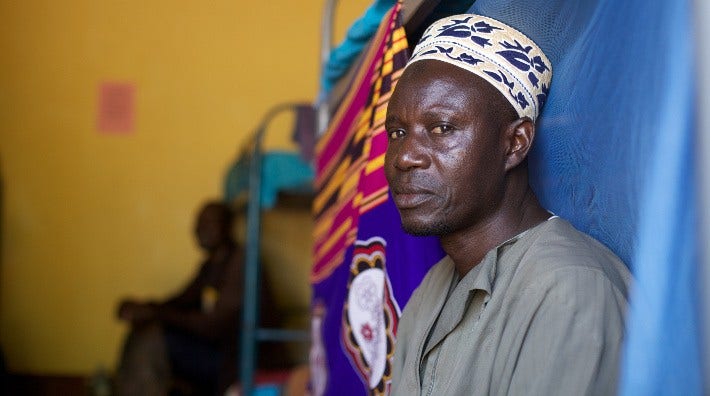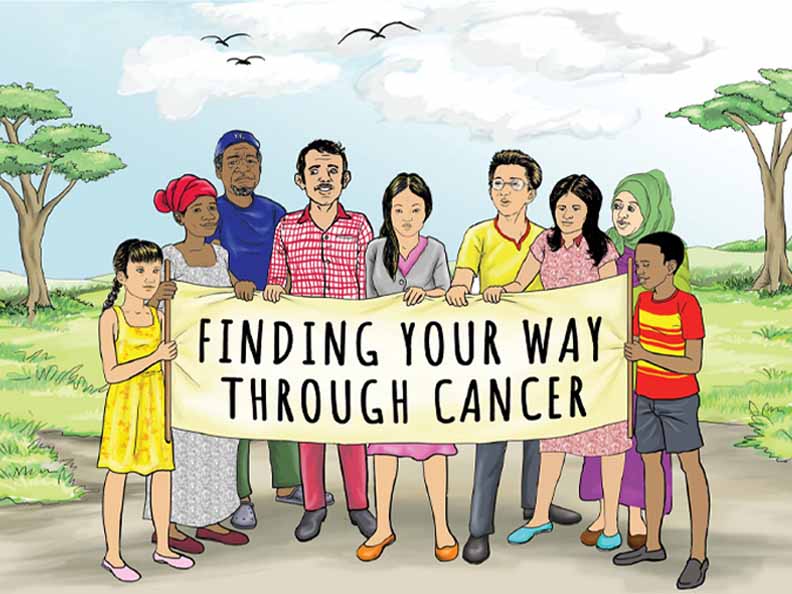Global Patient Support

The American Cancer Society Global Patient Support team works with health care facilities and organizations in LMICs to help cancer patients and their caregivers on their cancer journey by promoting patient-centered care through the implementation of patient navigation and cancer education for patients and caregivers. The goal is to remove barriers to care, reduce patient suffering, increase treatment adherence, and improve health outcomes. The team provides training, guidance, and mentorship to health care facilities and cancer-focused organizations to ensure that cancer patient care and support services are coordinated, comprehensive, and effective.
Patient Navigation
“When I learned that I had cancer, I was very scared. However, after meeting with Helen, one of the navigators, I learned a lot more about cancer and felt encouraged to seek treatment. Helen served as an advisor throughout my difficult journey through chemotherapy, as she helped me learn about the side effects of treatment and how I could manage them. Now, I’m almost finished with treatment and am deeply grateful for all that the navigation team has done to help me through this time.”
–39-year-old patient with breast cancer at Kenyatta National Hospital
Patient navigation is a process that offers personal guidance for patients, their families, and caregivers as they move through complex care systems. In cancer care, patient navigation can help ensure timely diagnosis and treatment, and provide support when patients run into challenges along the way. Patient navigators can be nurses or laypeople who are trained for their unique roles.
The American Cancer Society has a long history of working to reduce barriers for cancer patients in the United States (US). However, the needs of cancer patients and their families in LMICs can be even greater than for patients in the US. These patients are often more vulnerable due to higher rates of poverty, health facilities and systems that are severely under-resourced (e.g., specialized staff, equipment, medicines, etc.), low levels of understanding cancer, and limited patient support services. All these factors contribute to poor health outcomes.
Starting in 2016, ACS began collaborating and supporting partners in Kenya and Uganda to build comprehensive patient navigation programs to demonstrate that patient navigation can be an effective and viable patient-centered care delivery model for health institutions in LMICs. The successes to date at Kenyatta National Hospital (KNH) in Nairobi, Kenya and the Uganda Cancer Institute (UCI) in Kampala, Uganda have inspired an expansion of this work to other parts of the world.
The ACS Building Expertise, Advocacy, and Capacity for Oncology Navigation (BEACON) Initiative supports health institutions and cancer organizations in LMICs and other relevant settings around the world focused on addressing health disparities in cancer care, in designing, implementing, and sustaining cancer patient navigation programs and supports the integration of patient navigation into cancer control planning and cancer care delivery.
The BEACON Initiative is made up of two key complementary components:
- The Global Oncology Navigation Toolkit: a curated collection of practical resources to help users lead key processes and complete specific activities to design, launch, implement, sustain, and grow patient navigation programs uniquely suited to their local context, the needs of their patients, and their resource base.
- The Community of Practice: the global network of patient navigation practitioners that is growing over time as ACS systematically invests in building and strengthening the field of global oncology navigation. Community members are invited to join an online platform to share experiences and to participate in virtual events that introduce them to others facing and addressing similar challenges through the development and implementation of patient navigation.
The BEACON Initiative supports members spanning all regions of the globe who, through patient navigation, are dismantling patient barriers to quality cancer care and reducing disparities in access and outcomes.
If you would like to learn more, please visit our Beacon Initiative website.
Patient and Caregiver Education
“When people come and ask me what made me sick, I do not tell them it is cancer. I do not tell them because people will abandon me-they think it will ‘stick’ to them.”
-A patient in Ethiopia on why she didn’t tell people about her diagnosis
The American Cancer Society has been helping to raise public awareness about cancer in the US for more than 100 years. In the past, cancer was a disease regarded with such fear and denial that it was rarely mentioned in public. People in LMICs face those same challenges today. They often do not know much about cancer and its causes. Some have misperceptions about the disease, partly due to common myths and stigma. This is also because there are very few culturally relevant resources available to educate doctors, patients, and caregivers better.

The ACS Enabling Quality Interactions between Providers and Patients through Education Delivery (EQUIPPED) Initiative enables health institutions and cancer organizations in LMICs to train and equip their staff to provide high-quality cancer education to newly diagnosed patients and their caregivers — education that is people-centered, scientifically accurate, culturally and linguistically appropriate, and enhances patients’ understanding and decision-making around treatment.
Since 2015, ACS has worked with local governments, national hospitals, and cancer organizations in Ethiopia, Kenya, and Uganda to develop, disseminate, and train healthcare providers on cancer education materials that:
- Define what cancer is, including possible signs and symptoms
- Identify risk factors for cancer
- Describe different types of treatment and related side effects
- Promote pain control and timely treatment
- Break down the stigma and myths associated with cancer
- Explain how to take care of oneself on the treatment journey
These materials open new channels for communication and offer hope to families affected by cancer.
ACS Global Cancer Education Materials for Patients and Caregivers (CEMPC)
Building on successes with these materials in East Africa and given the similar needs of cancer patients in LMICs, ACS collaborated with Hesperian Health Guides to create two additional ready-to-use, ACS Global Cancer Education Materials for Patients and Caregivers (CEMPC).
- Patient and caregiver booklet - Finding Your Way Through Cancer: Answers to Common Questions
- Health worker flipchart - Finding Your Way Through Cancer: A Flipchart for Cancer Education

Topics in the CEMPC include:
- Tips for providers on counseling people with cancer
- Cancer basics: e.g., what is cancer, stages of cancer, cancer risk factors, how cancer is diagnosed
- Cancer treatments and side effects
- How to cope with a cancer diagnosis
- Where to find more information and support
These materials:
- Are free of charge and ready to use
- Feature relatable imagery with representation from around the world because cancer affects everyone
- Can be co-branded by partnering healthcare facilities or organizations
- Are available* in the following languages:
*Review copies of each material are available for download by language from the links above. If you are interested in receiving digital copies for printing or digital use, please write to us at globalpatientsupport@cancer.org. The ACS Global CEMPC are also supported by a training curriculum that helps health care workers deliver patient-centered cancer education in their day-to-day interactions with patients and caregivers, so they understand the disease of cancer, make better decisions about their treatment, and get the help they need and deserve.
ACS plans to translate the materials into additional priority languages spoken in LMICs around the world soon.
Give Your Feedback
ACS seeks feedback on the use and the utility of the ACS Global CEMPC in various settings. We would appreciate you sharing feedback on the materials you review and/or use in this ACS Global CEMPC Feedback Survey. Download this Global CEMPC Review Guide to review the survey questions in advance.
If you would like more information on EQUIPPED Initiative resources, please reach out to us at globalpatientsupport@cancer.org.


